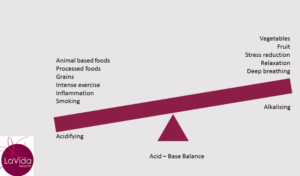There are a number of possible reasons why you feel tired all the time. Today I want to address some of the hormonal reasons why you might be tired….specifically the effects of stress on your adrenal glands which can lead to adrenal fatigue or exhaustion with the potential for flow-on effects on your nervous system, thyroid function, cardiovascular system and reproductive hormones.
The role of your adrenal glands
Your two adrenal glands sit just above your kidneys. They are small but vital organs for good health. The adrenals produce a number of hormones and chemicals including cortisol, adrenaline, aldosterone, and precursors to some of your reproduction-related hormones such as DHEA and testosterone.
They play a part in many aspects of your bodily functions including:
- Regulation of potassium and sodium to aid in the body’s management of blood volume and blood pressure (via the hormone, aldosterone)
- Breakdown and utilisation (or storage) of carbohydrates, fats and proteins (via cortisol)
- Your immune response (via cortisol)
- Supporting normal sex hormone levels and ratios (via DHEA mainly)
- Your ability to cope with stress (primarily via cortisol and adrenaline)
Today I am focussing on the effects of stress on your adrenal glands and consequently, your health.
What happens when you are stressed?
We all experience some level of stress every day of our lives. Stress switches on the “fight or flight” response of your sympathetic nervous system (the adrenals are part of this system).
Activation of your stress response leads to an increase in blood pressure and heart rate, an increase in blood glucose levels, a drop in digestive activity and a decline in reproductive hormones. Most of this happens via an increase in the production of cortisol and adrenaline.
This makes sense when you think about it. Your stress response is your survival mechanism. If you are under attack (i.e. stressed) your body switches into survival mode. Your blood pressure goes up and there is increased blood flow to your heart, brain and muscles so you can run away from the threat or fight it (fight or flight). The last thing your body needs to be concerned with is matters of digestion or reproduction. Your main focus at this time is to survive the threat.
Sounds good…so what’s the problem then?
These survival mechanisms are designed to allow us to handle a short term threat (stressor). Either we get away (fly) or we stay and fight (and hopefully live). Regardless of your action, it will all be over quickly and your stress response should switch off, allowing the body to return to normal function, blood pressure declines, digestion and reproduction return to normal activity.
The problem is, in our current world, for many of us, the stressors rarely go away. There seems to be one after another and as a consequence, we spend a lot of our days and nights in “fight or flight” mode.
Modern-day stressors
These days our predators come in different forms from the sabre-tooth tigers of old. Stressors can be a very individual and personal thing…one person’s stress is another person’s relaxation.
Stress can come in the form of:
- Financial pressures
- Deadlines
- Difficult people
- Children or family obligations
- Alarm clocks
- Incessant emails
- Never-ending to-do lists
- Illness or pain
- Infections or allergies
- Physical injury or trauma
- Emotional trauma
- Lack of sleep
- A poor diet low in essential nutrients and high in sugar, additives, chemicals, alcohol, caffeine
- Smoking
- Carrying additional weight
- Overexertion or overtraining
- Lack of relaxation
- Exposure to toxins, pesticides, endocrine disruptors
- And the list goes on….
Now would be a good time to make a list of all the things that are stressors in your life. How long is that list?
Why is stress a big deal for your adrenal glands?
By now you’ve probably worked it out. It’s a bit like driving your car in first gear all the time. Your adrenal glands are working very hard to keep up with the demands of your stressful life. Eventually, they just can’t keep up with all the signals they receive and you can be left with what is referred to as adrenal fatigue or adrenal exhaustion.
This is something that, as a naturopath, I see frequently. And when you consider the effects stress has on your biochemistry, especially your immune system, hormones (including thyroid and sex hormones), cardiovascular system and digestion, you begin to see why a sustained period of stress in your life can play havoc with your health.
Symptoms of adrenal fatigue or excessive stress response
As I’ve said before, we are all unique so for one person, increased stress might result in more headaches but for someone else, it might be poor digestion or recurrent infections, or persistent fatigue or sleep problems. Personally, I think stress exacerbates just about every health problem you can think of.
Some of the clues can be:
- Fatigue which doesn’t respond to a good night’s sleep (you wake unrefreshed and have difficulty getting out of bed)
- Feeling tired, yet unable to sleep (“tired but wired”)
- A declining ability to cope with everyday stress like you used to (i.e. a lack of resilience)
- A general feeling of being run down or exhausted
- Craving salt or sugar
- Increased dependence on caffeine or similar stimulants to get through the day
- Hot flushes (particularly night sweats)
- Fluid retention (e.g. swollen ankles)
- Increased anxiety, irritability or loss of joy and pleasure
- Changes in menstrual cycle or increased PMS
- Persistent and recurrent infections
- Increased susceptibility to allergies or hayfever
- Feeling light-headed or dizzy
The naturopathic approach to looking after your adrenal glands and supporting your stress response
First of all, it is important to rule out other possible causes of your symptoms (as there are many possibilities including hypothyroidism, Addison’s disease, depression, infections, anaemia or autoimmune diseases). We do this by taking a very thorough history and symptom picture and combining this with some pathology tests (many of which you may have already done).
Once these have been ruled out or addressed, we nourish your adrenal glands back to health. This is done through a combination of nutritional and herbal treatments along with dietary and lifestyle changes.
Rest and relaxation are vital to making a good recovery. You need to turn down your sympathetic nervous system and dial up your parasympathetic nervous system (which is required for rest and repair). Great tools for doing this include gentle yoga, meditation, relaxation breathing and laughter. You can also dip into tips for unwinding after a busy day).
There may be other non-hormonal reasons why you feel exhausted much of the time. They include factors relating to your diet and digestion, inflammation, underlying infections and toxicity. (if you suspect this may be you, you can dig a little deeper into this topic here).
The good news is, there is so much you can do to improve the health of these vital little glands and you’ll really reap the benefits.
An update…
[This blog was written in 2016 and scientific research moves at a rapid pace. I have since written another blog – “Are you suffering from adrenal fatigue?” which presents more current thinking. However, I have left this blog intact as it still provides useful and relevant guidance as to the role of your adrenal glands, the causes of stress and the symptoms of, what we now think of, as adrenal dysregulation.]





